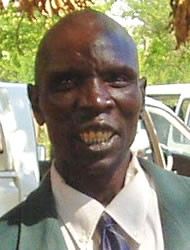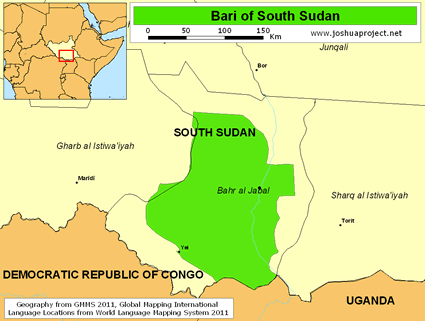Baris are also called Karo. Their language is Bari. Most live in South Sudan, but there are also thousands in the Democratic Republic of the Congo and Uganda. A smaller number are in the United States.
The Karos (AKA, Bari) are a music loving people as a characteristic of all human beings. Their traditional dance is full of styles and song lyrics. Their songs cover historical events, love, lamentation, praise, education, religion, etc. The wore (dancing field, pronounced as wohreh) is frequently visited during the dry season as it is a taboo to organize for a dance during the rainy season. This is because it would interrupt people from cultivation. Once the drum is hit during the rainy season, it would postpone the rain till the breacher is identified and punished.The time for dance is always welcomed by everyone since it is the opportunity for the youth to learn new things - how to approach ladies for future wives, how to beat the drum, how to dance, how to sing, and how to associate with non-family members. The dance is also necessary to keep the tribe together. The dance is always danced at night and throughout the night. When the youth are overexcited, they may dance for a week consecutively. Boys interested in learning to play the drum can do so in the evenings during the dry season, as nighttime is not permitted for learning.A Bari band consists of the löri ngote (mother drum), kengere (open-ended drum), and the kikili or kikililö in plural (small drum), which are sometimes two in number and hit by one person altogether, and the gwele (metallic gongs), gwirya (rattles), and toryo (horns). Baris generally have four types of dances based on specific occasions - feasts, weddings, funerals, victory over an enemy, disease, or a plentiful harvest. Namely, Kore, bula, tibidi and nyale. A brief explanation for such types of dance is provided below. The Kore consists of several dance divisions that are associated with different situations. 1. Kil 'di: This is a war dance. It gives the fighters the moral and vigor needed in a successful fight. This can be compared to the rock and blues genre in modern music. 2. Kisonde: This is a dance of praise, especially in honor of a hero after war or in honor of a lover. This is where one shows off the styles and skills of dance. 3. Lominimini: This is a competitive dance. It tells who is the most energetic dancer. This is judged from whether a person is able to endure the dance for long or whether the dancer is able to jump the highest. One may win a mate for being envied by several persons of the opposite sex. 4. Ryoket: This is a slow dance whose purpose is to boost the energy of the dancers after dancing for a long time before dawn. 5. Gwele: As its name suggests, this dance happens after a group of youth contributes food items to be eaten together and results in a dance bearing the name gwele (contribution). In this dance, people usually dance it during the day (dawn or dusk) because it involves scoring BULA This is a dance that is danced without any drum but with hand clubs and singing. It is usually danced during child naming ceremonies. Excited kids may start it, but it can quickly explode into a great dance. TIBIDI This and the Bula are the dances that tell the Nyepo from the other Bari-speaking tribes. It is mostly danced during funerals.It is no longer practiced. The Kore is a name that is given to different dance types according to the tribe one belongs to. The correct meaning is chore. This Nyepo dance was inherited from the Bari. Other tribes may share the name Bula, but the dances can never be the same.
Almost all the Baris identify as Christian, though there are still animistic elements that keep them away from a full relationship with Jesus.
Baris need the spiritual hunger it takes to seek, find, and embrace Christ without allowing any hindrance to their spiritual lives.
Pray for hundreds to be raised up with an unwavering faith in Christ, one that will not be shaken, no matter what comes their way.Pray for God to bring about his purpose for the Bari people.Pray for Christians to have love, joy, peace, and patience as they tell others about the King of kings.Pray for a mighty Holy Spirit revival to permeate their families and churches, drawing them into greater love for God and for their neighbors.
Scripture Prayers for the Karo, Bari in South Sudan.
Anonymous
| Profile Source: Joshua Project |












